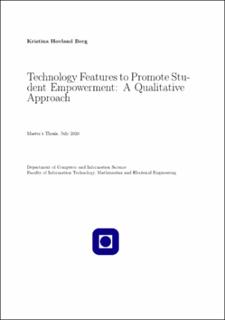Technology Features to Promote Student Empowerment: A Qualitative Approach
Master thesis
Permanent lenke
https://hdl.handle.net/11250/2777883Utgivelsesdato
2020Metadata
Vis full innførselSamlinger
Sammendrag
I mars 2020 nådde koronaviruset Norge og andre europeiske land, og for å unngå større spredning ble restriksjoner innført, som førte til en hurtig digitalisering av utdanningsprosessene. Faglitteratur viser at teknologi can ha en positiv effekt på "empowerment" hos studentene. Denne studien forsøker å forstå studentenes tilpasning til digitaliseringen og hvordan den påvirket deres følelse av "empowerment". I lys av koronavirus-restriksjonene og eksisterende literatur på "empowerment": "Hvordan kan læringsteknologier på universiteter i Norge føre til 'empowerment' for studenter?".
Ti norske studenter ble intervjuet om hvordan deres måte å studere på endret seg etter at koronavirus-restriksjonene ble innført. Kvalitativ data ble deduktivt analysert ved å bruke stikkord fra ``empowerment'', og deretter induktivt analysere basert på ofte nevnte temaer av studentene. Dataene viser at teknologier som engasjerer studentene er modifiserbar og mulig å endre til studentenes behov, og fører til aspekter ved "empowerment" som selvtillit, selvstyre og selvbestemmelse. Mange av teknologiene som universitetene tilbyr innehar ikke disse kvalitetene, noe som gjør studentene demotiverte og frustrerte. Samarbeid spiller en stor rolle i studentenes liv, og teknologien har til gode å tilstrekkelig erstatte opplevelsen av et fysisk møte. Videre forskning burde undersøke hvordan og hvorfor universitetene velger teknologier som er "disempowering", ettersom mer engasjerende teknologier allerede eksisterer og er tilgjengelig. In March 2020, the coronavirus reached Norway and other European countries, and to avoid further spread, stay-at-home restrictions were introduced, which lead to instant digitization of education. Literature shows that technology has a positive effect on student empowerment. This study aims to take a deep dive into the students' adaption to the digitization and how it affected their sense of empowerment. In the light of the coronavirus restrictions and existing literature on empowerment, the research question of this thesis is: "How does learning technologies at universities in Norway support student empowerment?".
Ten Norwegian students were interviewed about how their way of studying changed after the coronavirus restrictions. The qualitative data were deductively analyzed using keywords from the literature on empowerment, and then inductively analyzed based on common themes and sayings by the students. The data suggests that technologies that engage the students, are modifiable and adjustable to the students' needs, lead to empowering aspects such as confidence, self-management and self-determination. Many of the technologies offered at universities do not have these characteristics, which makes the students demotivated and frustrated. Cooperation plays a big part in the students' lives, and technology has yet to sufficiently replace the experience of a physical meeting. Future research should investigate how and why universities choose disempowering technologies when more engaging technologies already exist and are available.
